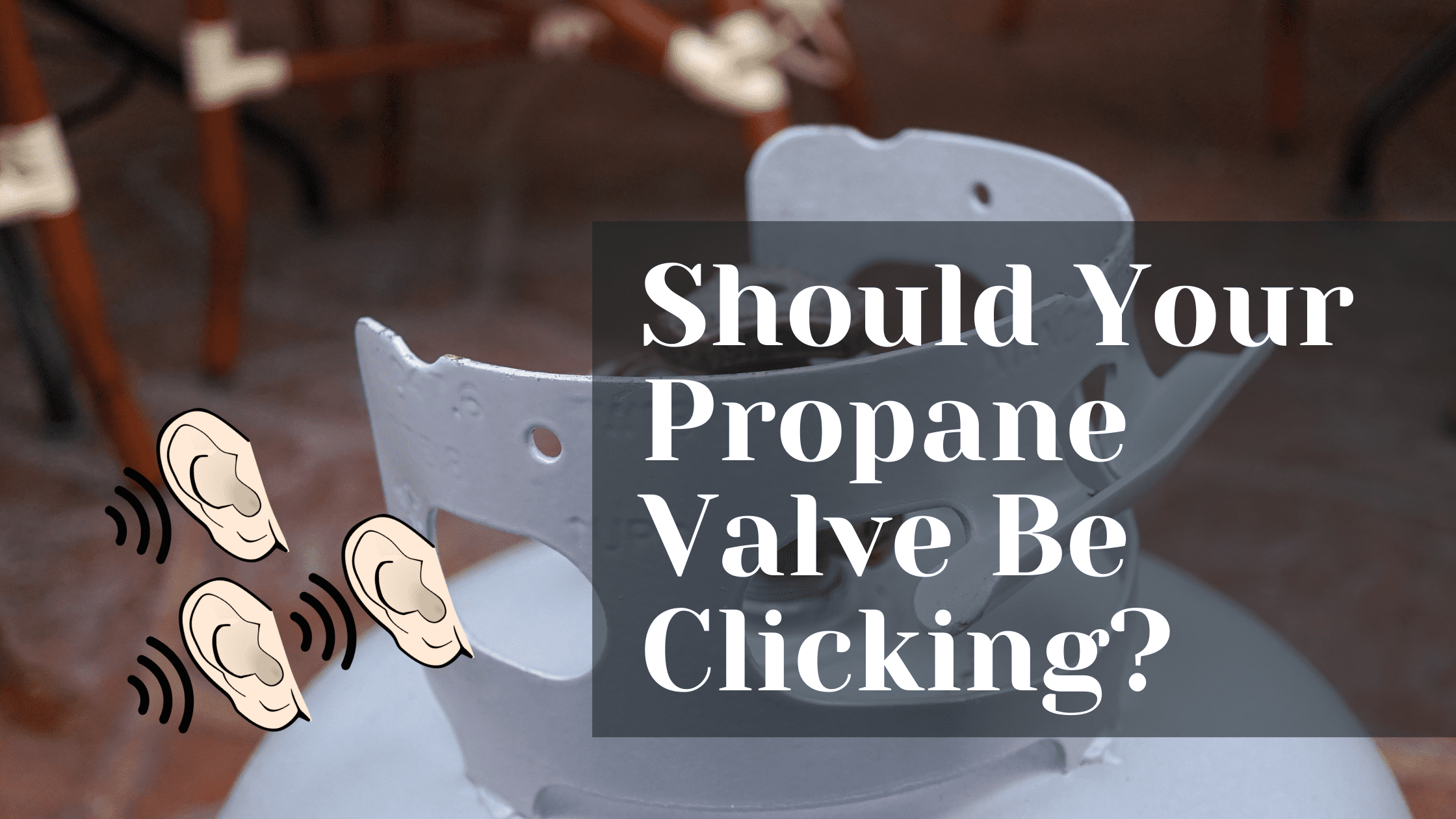Propane is a great way to heat your home, your grill, and many other things without leaving a huge impact on the environment. Sometimes you may hear a noise coming from your propane tank and wonder what’s wrong with it. So why is your propane valve clicking when you open it?
A steady clicking means that your propane valve is working properly. However, if the clicking is loud or rapid, you may have to fix or replace your propane valve. There are also other sounds that you may hear coming from your propane valve, which could mean you have bigger safety issues.
This article will explain the main reasons that your propane valve may be clicking when you open it. Then, we’ll describe some other common sounds that propane tanks and valves make and what these sounds mean. Finally, we have some propane safety tips and some recommendations for propane valves and accessories.
Reasons for Propane Valve Clicking
A clicking noise coming from your open propane valve is very common, and it can mean two things. These are:
- A steady, quiet clicking noise. This means that your propane valve is working properly.
- A louder or faster clicking. This means that something is wrong with your valve or your tank.
Quiet Clicking
A steady, quiet clicking sound means that your propane valve is working as it should. You can continue to use your propane tank and valve with no issue, and continuing to open it won’t cause any issues.
The purpose of your propane valve is to control how much gas is coming out of your propane tank at any given time. It works similarly to a sink faucet. If the valve is turned one way, you can completely close the valve and shut off any gas from exiting the tank. When you turn the valve fully in the other direction, you are opening the valve completely, and you’ll maximize propane flow from your tank.
Rapid or Loud Clicking
If your propane valve is making a loud clicking sound or a clicking sound at a rapid pace, there’s something wrong with your propane valve. You need to determine the issue with the valve immediately before you resume using your propane tank. Otherwise, you could have a safety issue.
Sometimes a valve isn’t working properly because it’s not properly screwed onto the tank. If you know how to do so, you can remove and properly re-screw the valve yourself. To learn how to safely remove a propane valve, watch this video from HNX Media on YouTube:
Another reason that your propane valve may be loudly or rapidly clicking is that the valve is broken. When your valve is broken, you need to make sure that the tank itself, where the valve screws in, isn’t what’s broken but the valve itself. Otherwise, you need to replace the whole tank.
If you’re sure that the valve is broken and not the tank, you can simply replace it using the video above. Make sure you buy the right valve for your propane tank. Otherwise, you’ll hear more noise or pose a safety issue.
Other Propane Valve Noises
Propane tanks and valves can make noises other than clicking that aren’t normal, and they mean something is wrong.
You should be concerned if you hear a wheezing sound from your propane tank. A wheezing sound generally means that your propane tank is leaking. You might also be able to smell the gas leaking from the tank if you’re near it.
A leaking propane tank can cause many safety issues since there’s gas being released into the air. If your propane tank is inside, you need to take it outside immediately. You don’t want gas leaking inside your home. Make sure it is away from any people, animals, or open flames.
If the valve is leaking, you need to close it immediately and determine whether or not you can still use it going forward. If you can’t use the valve, be sure to replace it before you use your tank again.
However, if the tank itself is leaking, you need to get a new one as soon as possible. Don’t try to fix your leaking propane tank, and make sure to dispose of it properly.
Furthermore, you may hear a knocking sound coming from your tank. This noise means that the air and gas mix in the tank isn’t evenly distributed, and you should stop using your tank. If you see yellow flames, your propane tank has an uneven distribution, and you need to get it fixed before you can continue using it.
Finally, you may hear a humming or gurgling sound coming from the tank, which means your tank is overfilled. You can also look at your tank’s gauge to see how full it is. A too-full tank poses a safety threat, so you should have a professional look at it.
Safety Considerations When Working With Propane
While different noises mean different things, and some shouldn’t cause any alarm, there are some steps you can take to keep you and your home safe if something does go wrong with your propane.
First, make sure to always keep your propane tank outside. Keeping it inside your home or anywhere else poses a major health threat to you and your family if there’s a gas leak or anything else happens to it.
Second, if you smell gas, act immediately. You shouldn’t delay if there’s a gas leak as it can detriment your health and safety. Turn off the propane tank immediately and stop using it. Report the gas leak to your local professionals and leave the area once you ensure no fire risk near the gas leak. If you’re confident in your ability and the situation isn’t dire, you may consider repairing the leak.
Also, watch your propane’s flame color. You always want to see a blue flame when your propane tank is on. If you see a different color, something is wrong. Yellow flames can mean carbon monoxide coming from your propane tank, and you need to stop using it immediately.
Finally, there should be no soot near or in your propane tank. Propane doesn’t produce anything when it burns, so if you do see anything, the propane isn’t burning right. Soot could mean there is a gas leak or carbon monoxide.
Replacement Valves and Accessories
If you need to replace your propane valve, here are some great ones that are easily available on Amazon.com (paid links):
- Rotarex Valve: This propane valve has a seven-inch dip tube, and it works with a majority of standard propane tanks. You can use it with your grill or for cooking, camping, and heating.
- SHINESTAR Propane Tank Gauge: This is not a valve itself but rather a gauge that you can use with your valve to keep an eye on how high or low your tank is. The gauge is easy to read with a large dial and a color-coded number system. There is a built-in leak detector, and the gauge will stop the gas flow if there is a leak.
Final Thoughts
If your propane tank makes a clicking sound when you open it, it means that it’s working properly, unless the clicking noise is usually fast or loud. In this case, or if you hear other noises like wheezing, hissing, or knocking, something is wrong with your tank, and you need to replace it or have your propane tank specialist come look at it before you can continue to use it.
Sources
- IPS: Propane Valves
- AmeriGas: Propane Safety Tips from AmeriGas Propane
- Superior Propane: Propane Tank Noises: What They Mean

